#a different set of jews
Explore tagged Tumblr posts
Text
I guess this might be why the UK seemed to go so antisemitic so quickly
I'm researching the 1947 pogroms in the UK. (Actually, I'm researching all the pogroms and massacres of Jews in the past 200 years. Which today led me to discover that there were pogroms in the UK in 1947.)
From an article on "The Postwar Revival of British Fascism," all emphasis mine:
Given the rising antisemitism and widespread ignorance about Zionism [in the UK in 1947], fascists were easily able to conflate Zionist paramilitary attacks with Judaism in their speeches, meaning British Jews came to be seen as complicit in violence in Palestine.
Bertrand Duke Pile, a key member of Hamm’s League, informed a cheering crowd that “the Jews have no right to Palestine and the Jews have no right to the power which they hold in this country of ours.” Denouncing Zionism as a way to introduce a wider domestic antisemitic stance was common to many speakers at fascist events and rallies. Fascists hid their ideology and ideological antisemitism behind the rhetorical facade of preaching against paramilitary violence in Palestine.
One of the league’s speakers called for retribution against “the Jews” for the death of British soldiers in Palestine. This was, he told his audience, hardly an antisemitic expression. “Is it antisemitism to denounce the murderers of your own flesh and blood in Palestine?” he asked his audience. Many audience members, fascist or not, may well have felt the speaker had a point. ...[The photo of two British sergeants hanged by the Irgun in retaliation for the Brits hanging three of their members] promptly made numerous appearances at fascist meetings, often attached to the speaker’s platform. In at least one meeting, several British soldiers on leave from serving in Palestine attended Hamm’s speech, giving further legitimacy to his remarks. And with soldiers and policemen in Palestine showing increasing signs of overt antisemitism as a result of their experiences, the director of public prosecutions warned that the fascists might receive a steady stream of new recruits.
MI5, the U.K. domestic security service, noted with some alarm that “as a general rule, the crowd is now sympathetic and even spontaneously enthusiastic.” Opposition, it was noted in the same Home Office Bulletin of 1947, “is only met when there is an organized group of Jews or Communists in the audience.”
The major opposition came from the 43 Group, formed by the British-Jewish ex-paratrooper Gerry Flamberg and his friends in September 1946 to fight the fascists using the only language they felt fascists understood — violence. The group disrupted fascist meetings for two purposes: to get them shut down by the police for disorder, and to discourage attendance in the future by doling out beatings with fists and blunt instruments. By the summer of 1947, the group had around 500 active members who took part in such activities. Among these was a young hairdresser by the name of Vidal Sassoon, who would often turn up armed with his hairdressing scissors.
The 43 Group had considerable success with these actions, but public anger was spreading faster than they could counter the hate that accompanied it. The deaths of Martin and Paice had touched a nerve with the populace. On Aug. 1, 1947, the beginning of the bank holiday weekend and two days after the deaths of the sergeants, anti-Jewish rioting began in Liverpool. The violence lasted for five days. Across the country, the scene was repeated: London, Manchester, Hull, Brighton and Glasgow all saw widespread violence. Isolated instances were also recorded in Plymouth, Birmingham, Cardiff, Swansea, Newcastle and Davenport. Elsewhere, antisemitic graffiti and threatening phone calls to Jewish places of worship stood in for physical violence. Jewish-owned shops had their windows smashed, Jewish homes were targeted, an attempt was made to burn down Liverpool Crown Street Synagogue while a wooden synagogue in Glasgow was set alight. In a handful of cases, individuals were personally intimidated or assaulted. A Jewish man was threatened with a pistol in Northampton and an empty mine was placed in a Jewish-owned tailor shop in Davenport.
And an important addendum:
I've read a whole bunch of articles about the pogroms in Liverpool, Manchester, Salford, Eccles, Glasgow, etc.
Not one of them has mentioned that the Irgun, though clearly a terrorist group, was formed in response to 18 years of openly antisemitic terrorism, including multiple incredibly violent massacres. Or that it consistently acted in response to the murders of Jewish civilians, not on the offensive. Or that at this point, militant Arab Nationalist groups with volunteers and arms from the Arab League countries had been attacking Jewish and mixed Arab-Jewish neighborhoods for months.
I just think the "Jewish militants had been attacking the British occupiers" angle is incredibly Anglocentric.
Yeah, they were attacking the British occupiers. But also, that's barely the tip of the iceberg.
Everyone involved hated the Brits at this point. If only al-Husseini and his ilk had hated the Brits more than they hated the Jews, Britain could at least have united them by giving them a common enemy.
#jewish history#jumblr#fascism#antisemitism#when anti-zionism IS antisemitism#seriously if you declare that something is never ever antisemitism we know you're writing yourself a blank check to be antisemitic#like. you may not consciously be aware of it#but the more you're emotionally invested in the idea that anything said or done in the name of anti-zionism isn't antisemitic#the more you will ignore or fail to notice or outright defend things that other anti-zionists do that ARE antisemitic#not to mention things that YOU do or say or believe that are antisemitic#especially because most people aren't very aware of the details of different antisemitic tropes#you're not an expert on what is antisemitic and why to begin with and now you're buying into a belief that muffles your perception of it#and gives you motivation to disbelieve and deny it#and there's already psychological motivation to disbelieve and deny it when it's coming from you or your peers or people you admire#and then there's the belief that jews just cry antisemitism to silence valid criticism#aka the exact thing that we always say marginalized groups don't do. and that it's offensive to claim marginalized groups do. that one.#the entire discourse has been set up to protect and propagate antisemitic beliefs from the start#which is not particularly progressive nor is it necessary if you actually want to support palestinians but go off etc#wall of words
295 notes
·
View notes
Text
I'm glad we had a conversation about the real important topics in shul: whether or not we do kosher minecraft runs and why it is/isn't permissible to not follow kashrut
#jumblr#jewish conversion#jew by choice#personal thoughts tag#shul shenanigans#see i always do vegetarian runs if i play minecraft (rarely)#but i do like to impose arbitrary rules in games i play in general so a kosher-themed run is always fun#because you can imagine that in a video game set in a completely different world that kashrut laws don't really exist there#so your player character is the only one in that entire world who's like 'no thanks🩵' to pork#but i HAVE seen some people earnestly debate this topic because it is interesting#would it be permissible to 'force' a video game character to break those expectations?#would it be permissible in a role-playing game like minecraft that encourages you to self-insert?#both those questions can have broader implications re: how we go about setting expectations and limits and whatnot
85 notes
·
View notes
Text
Can people please stop comparing current events to the holocaust???
#jumblr#antisemitism#please stop doing this#it lowkey does not set well with me#what’s currently happening now is totally different than the holocaust#the holocaust was a genocide against the Jews#I hate seeing multiple posts about this being the new holocaust#goys do better#please#also please stop bringing Anne frank into this
12 notes
·
View notes
Note
hi i saw your ask to applesauce and i just wanted to say im so proud of you for pulling yourself out of the radicalization pipeline, that takes true strength and bravery
thank you :) it’s tough because those spaces are excellent at conditioning people who have no involvement with the conflict whatsoever into a very absolutist “you must be thinking and talking about this issue at all times, otherwise you are a Bad Person who supports Bad Things and deserves to Die” mindset but really any “peace activist” whose “solution” relies on the complete demonization and dehumanization of another group of people does not care about peace or activism at all and i’m much happier now that i’ve stopped giving antisemitic bullshit any sway over my life. obviously does not absolve me from the harm i caused by being a part of it but i’m glad that i no longer am
#like. it is insane how quickly supposed “progressives” (me included) were able to set aside the idea that like#two things can be true at once and human rights are unconditional and a marginalized group gets to define their own oppression#in favor of centuries of deep seated cultural antisemitism because if you don’t support the ruthless slaughter#of hundreds of civilians in their homes then you must support the killing and displacement of a different civilian group. apparently#and anyone saying “hey that first thing was bad actually” also supports this and is Lying and Looking For Pity#nuance just flew out the window and this shit is everywhere. it is much less distressing to live without that cognitive dissonance#and be able to condemn both things at once like a normal fucking person (but unfortunately not average)#i cant imagine how it feels to be a jew in diaspora right now i’m sorry the world’s gone fucking crazy and i’m sorry i did too#this got long but yes. thank you and i am trying my best to be a better person and safer for jews <3#pusheenthenerdcat#ask#leftist antisemitism
10 notes
·
View notes
Text
all is well as i slowly slide back into the intrest of band of brothers (2001) while i prepare to watch it for fun with my friends OH NO WHATS THIS A HYPERFIXATION ON THE SIMILARITIES BETWEEN JOE LIEBGOTT SEAN FINNERTY AND PERCIVAL DE ROLO COMING OUT OF NOWHERE WITH A STEEL CHAIR
#they have consumed me body and soul and like what the FUCK is up with that#percy's been my number 1 since i started crit role and something about sean just scratched my brain so well but then i went OH SHIT#it's liebgott too because something about an angry jew who just wants to kill nazis is so cathartic for me#also hes so bitchy and fun and full of the horrorsTM but like DUDE#i have a fucking TYPE#of favourite character like AAAAA#ITS JUST THE SAME TORTURED FERAL MAN IN A DIFFERENT SETTING AND A DIFFERENT FONT#PUT HIM IN HIGH FANTASY PUT HIM IN ELDRITCH HORROR PUT HIM IN WW2 I CANNOT ESCAPE THIS BITCH#it has been. 8 hours and i cannot stop thinking about any of them#also they're all hot. anyways-#andi's holy trinity of revenge#band of brothers#hbo war#critical role#candela obscura#bob#joe liebgott#joseph liebgott#percy de rolo#sean finnerty#andis thought geyesr
21 notes
·
View notes
Text
not to be political but I've seen a lot of people saying that those who call Israel an apartheid don't know what they're talking about and um. As someone who has studied South African apartheid as well as grown up in a Jewish community. This claim has more merit than you think
#this post is brought to you by an article i read “debunking” the claim that israel is an apartheid and their “evidence”#included several policies that are the same if not more intense than apartheid era policies against black south africans#there are comparisons that hold weight here#although one thing i dont get and havent had explained to me yet. it looks to me as though both arabs and jews are indigenous to the region#in the way that both the hopewell culture and lenape people are indigenous to my state of pennsylvania#and thats a flimsy comparison i suppose since the hopewell culture (who lived here first chronologically) has died out#but anyway theres a case for indigeneity for both jews and arabs#its so silly to me that we dont consider both to be indigenous? yes many jews that came into israel in the early 20th century were#white europeans and carried the colonial baggage of that with them#but idk why its so hard to believe that an oppressed group can also be an oppressor?? like where's the intersectionality babes#anyway. the original point of this post was that maybe more of yall need to look into what south african apartheid was actually like#much like h*m*s leadership a lot of the ANC leadership was forced into exile and had to live and work outside of their country#(and this comparison is not perfect im aware. the tactics of the anc and h*m*s are totally different. however i think this comparison has#weight in that they are both one of the biggest names in opposition to the government. they do this in different ways at different levels o#intensity and violence. that is not to be ignored. but there are some comparisons that we can make and exile doesnt strike me as a bad one)#the bantustans in south africa were also constructed in a way that much like the west bank makes it highly difficult for an actual real#state to form#and the way that theyre set up invites puppet governments and corruption. this gives a major advantage to the apartheid state#id recommend reading Trevor Noah's Born A Crime if you havent#its a great introduction to what daily life in aparthid and after was like (its a memoir from about 1990-2005ish)#(apartheid was legally ended in 1994 but there are still remnants of it today and there were even more at the time of Born a Crime)#anyway these are my political thoughts of the day#edit: to my tangent about both groups being able to have some sort of claim to indigeneity. that in no way justifies any of the brutality#going on#i think its espeically cringe of israel to claim indigeneity and a sacred relationship with the land then create an environmental#catastrophe like they have in gaza. making the land unliveable is a bit of a perversion of the relationship you have with that land innit#in case it wasnt clear: ceasefire now and free palestine
9 notes
·
View notes
Text
The fun thing about the rise in antisemitism and the insistence of leftists to conflate "zionism" with jews as a group (as evidenced by all the harassment of diaspora jews) is that it leaves precious little opportunity for jews who do support Palestinian freedom to join the movement without risking our own safety. And if this sounds made up or overly cautious, I'd like to remind everyone of that "we didn't realize we were palling around with nazis" post that's been going around.
#fuck the state of israel#but also fuck everyone who has decided that i-#a diaspora jew who has no connection to israel#and who has specifically set aside dreams of rabbinical school because i dont want to go to israel-#should be expected to weigh in on and publicly denounce the actions of a foreign government#(im in the US and have never been asked to denounce my own country's actions#but i gotta hold a press conference about my feelings on a completely different country halfway around the world)#it's fucked#anyway free palestine
8 notes
·
View notes
Text
this is a great example of antisemitic propaganda.
critical thinking questions:
1. is israel the only country on earth dropping bombs, even right now?
2. are there any sources listed, here or in the original post, for where these numbers come from?
3. what does it imply to have a graphic with a pair of hands holding the entire globe, with israel the only country mentioned?
3. a. And does this, by any chance, correlate to any well-known antisemitic conspiracy theories?
4. what emotions does this make you feel? who benefits from these emotions? who is harmed?

by studiosalud (2024)
#why are we holding this 1 country to different standards than any other country?#what's special about this 1 country that sets it apart from literally every other nation on earth?#other countries are doing genocide and colonialism. other countries are at war. other countries are dropping bombs#some of them entirely unprovoked may i add#ask yourself what makes israel so uniquely special and horrible that you need to spread harmful propaganda about it?#antisemitism#edited to add i went looking for the original post on Instagram and there's no sources for these numbers. and the whole account#is just whipping up jew hate with Third reich style antisemitic sorry 'antizionist'#propaganda graphics and memes. is also giving me voter suppression vibes. is a fairly new account. smells like a psyop ngl.#oh but there's a qr code where you can donate supposedly 'directly to palestinians in need'!#i have no way to ensure that this money actually goes to palestinians.#and i don't trust you. sorry.
19K notes
·
View notes
Text
Alright, Chanukah starts tonight, which means it's time for me to finally make a post about different kinds of menorahs.
This right here? This is the Temple Menorah:

There's some debate over whether the branches were straight or curved, but here's a few things we do know:
It had seven branches of equal length.
It was made of one solid piece of gold
It was at least five feet tall.
It used pure olive oil.
The Temple Menorah is what people mean when they talk about The Menorah. It's what you'll see on historical or commemorative artifacts such as the Arch of Titus in Rome or Israeli currency:
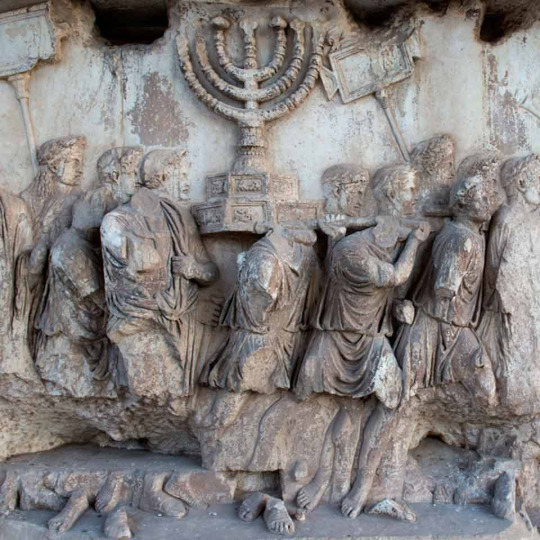
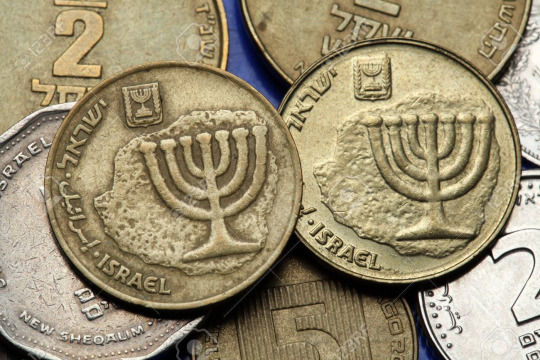
During the time when the Temple stood in Jerusalem, the High Priest lit all seven flames on this Menorah every day (using the aforementioned pure olive oil):

No one lights this on Chanukah.
This is a Chanukah menorah:

There are countless variations, but here are the important things:
It has eight branches of equal length, plus a ninth "helper" branch, known as the shamash, which is set apart from the rest of the branches and used to light the others.
It can be made of any material.
It is usually used with wax candles or oil, but, if necessary, one can use anything that burns.
In Hebrew, this kind of menorah is called a chanukiah.
Some Chanukah menorahs, like the one shown above, have the shamash in the middle. Others have it on the side:
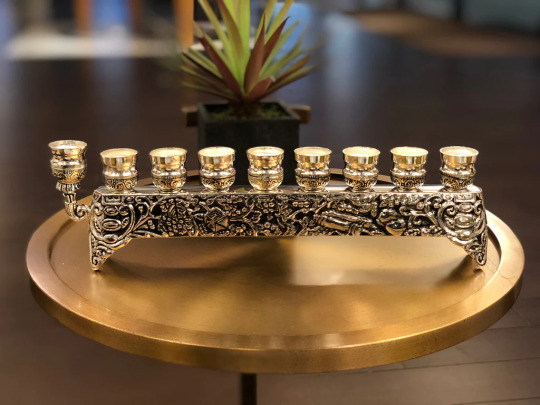
Regardless, this kind of menorah is the one that has been lit by Jews on Chanukah for thousands of years. It's the menorah you'll seen in photographs of Jewish households, including this famous picture taken in Germany in 1931:
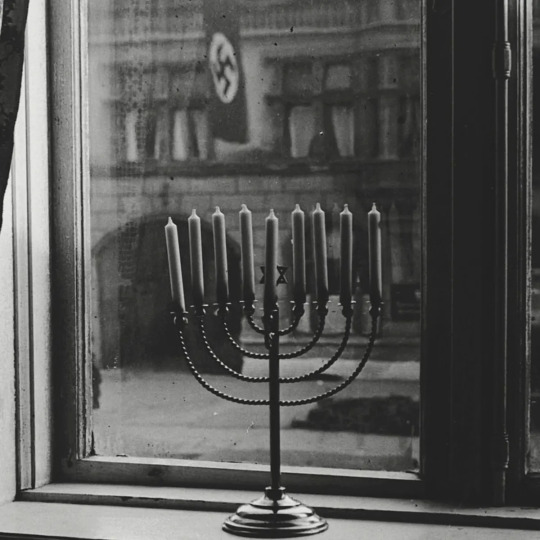
(The message written on the back of the photo reads: "Death to Judah"/ So the flag says/ "Judah will live forever"/ So the light answers)
On Chanukah, whoever is lighting the menorah will first light the shamash, then the number of candles corresponding to whichever night of Chanukah it is. The first night, only the rightmost candle is lit, the second night the two rightmost, etc. (The newest candle is always lit first):

Again, a valid Chanukah menorah has eight branches of equal length, along with a shamash. There is no such thing as a Chanukah menorah with six branches of equal length and a longer seventh branch, and no valid Chanukah menorah has eight branches of completely different lengths.
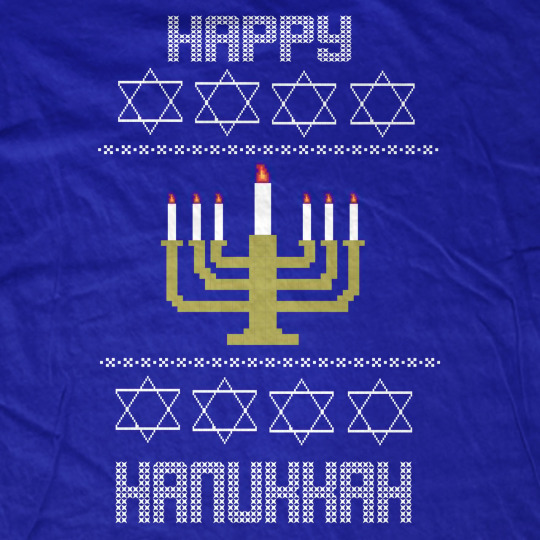

If you see either of the above designs (or anything similar) on Chanukah-themed decor, it tells you the creator has absolutely no idea what they're doing and couldn't be bothered to do more than two seconds of research to make sure their product was accurate. Anyone who knows anything about the holiday will laugh at these. (They may buy them anyway, especially if that's all that's available-- my new Chanukah sweater has an invalid menorah pattern, but it's adorable, so I'm still going to wear it. But I am also laughing about it and invite you all to do the same.)
Anyway, have a happy Chanukah, everyone!
#real life#jumblr#thoughts#menorah#chanukah#hanukkah#arch of titus#history lesson#the more you know#all queued up
7K notes
·
View notes
Text
rating different ways that characters are generally revealed to be jewish in tv and movies made by (mostly) goyim:
B'nei mitzvah mention: 3/10, points taken off for laziness. kept some because it's an important event so I get why it's used
B'nei mitzvah scene: 8/10, can either be really good or really bad depending how accurate. honestly ranges from a 5/10-11/10
Chanukkah mention: 0/10, im so tired of this one its so overdone and it's always in the christmas specials. it can be done right but like that's only if jews are writing the scene
Pesach mention: 4/10, definitely a better holiday to use than chanukah because it's not done to death and it isn't automatically paired with christmas. points removed for the inevitable inaccuracies
Rosh Hashanah mention: 7.5/10 just for using a holiday that most people wouldn't think of or may not even know of
Literally any other jewish holiday: 9/10 how do you know about this who told you
Any jewish holiday scene: 7.5/10, which actually means it can range from 5-10 depending on how ridiculous and wrong the scene is making my rating perfectly average.
shabbat mention: 8/10, kinda love it. it's also really good for casual conversations because its a weekly occurrence so there's plenty of ways for it to feel natural when bringing it up in a script
shabbat dinner scene: 15/10 absolutely love it especially bc it shows character dynamics in a casual setting. if there's anything incorrect it doesn't bother me much because the ways people observe shabbat vary a lot
"im jewish": 10/10 straight to the point no notes love it
literally any mention of money/greed/power: -10/10 shut up shut up shut up why is your only jewish character rich and greedy and why is that their defining trait
antisemitic comments: -15/10 why can't you think of anything nice to say.
nose comments: -100/10 needs to be in a separate category because I hate it so much. somehow even worse when its a goyische actor wearing a prosthesis and caked on "jewish" makeup bc like how are you being fake racist rn
not even saying anything and just making it painfully obvious: 8/10, yeah that character's last name is goldberg so it's pretty clear and I like that. I do wish it was mentioned upfront though
brit milah mention: 5/10, its usually played for laughs which feels a bit weird but not weird enough for me to care. this is a true neutral
having them wear a kippah/magen david/anything visibly jewish from the second theyre introduced: 100/10 my favorite by far because it's made clear from the start and there's no question about it
989 notes
·
View notes
Text
Native jewish miku 2.0
i really liked the trend so i wanted to try more dress ideas with more embroidery ideas i had. In this one i have a small explanation on the patterns on her dress

Don't mind the different style i am still finding myself i don't have oen consistent artstyle😭
The explanation about the clothes can be seen in my previous miku art and ofc it can't be jewish if there isn't some hebrew.
On the dress i wrote : am israel hai which means "the israel nation lives" (aka jews)
On the background i wrote: shiviti hashem lenegdi tamid which means "I have set G-d before me always"
Here is the background+the patterns on her dress:

Here is a small charts of what is each one:

Side note on "road to canaan": it was a concept a friend of mine had and i gave it life. The swirls represent the israelites walking in the dessert for 40 years and 'getting lost' and the flower is the "star of canaan" or what later became the "flower/star of bethlehem" that was spread worldwide to the world by the crusades and is a big part of the embroidery in a lot of places such as the arab palestinians (mainly), ukranians and more
#jumbler#am israel hai#ישראבלר#jewish#jews#judean embroidery#jewish history#jewish clothing#Jewish culture#Jewish clothes#Native fashion#Nativity#Ancient israel#Ancient judea#miku hatsune#jewish miku#Israeli miku#Judean miku#Israelite miku#hatsune miku#vocaloid miku#artist on tumblr#Israel#Henna#ישראל#י��דות#Culture#Indigenous#Jewish nativity#proud jew
590 notes
·
View notes
Text

@puppypalice what do you think a Zionist is, though? Because this implies that there's some kind of Zionist organization or political party that people can join.
As far as I can tell, there are two different definitions people are using for "Zionist."
People who don't think Israel should be violently destroyed.
A specifically Jewish movement of people who love genocide in general, or genocide of Palestinians in particular.
But there's not an organization for either of those things.
You seem to be picturing the second definition? But like... what are they joining? The IDF?
I know they're not joining some evangelical megachurch that wants Israel to exist so that the End Times can come or whatever.
Because nobody is protesting those. They rarely even get mentioned.
I know they're not joining Hamas/PIJ/PFLP, despite the fact that Sinwar said he would fight until the last child in Gaza; despite Haniyeh demanding "the blood of Gaza's children, women, and elderly;" despite the fact that Gazans loathe Hamas for starting the war, routinely torturing and executing dissenters, and committing countless atrocities against them over the past 15 months.
Because at best, nobody gives a shit about Hamas. And at worst, they buy the propaganda that Hamas is "the Palestinian resistance." (Instead of the We Want To Live movement and the Gaza's Liberators movement.)


Are future historians going to be saying this about anyone who hates and opposes Hamas? Because that seems to be what usually gets Gazan activists, and Jews, denounced as Zionists.
If so, that now includes not only most of Gaza:
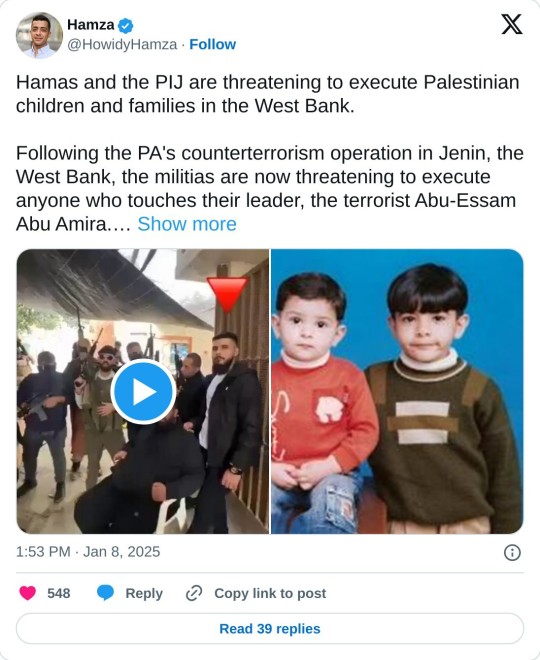
But also, the rest of Palestine:
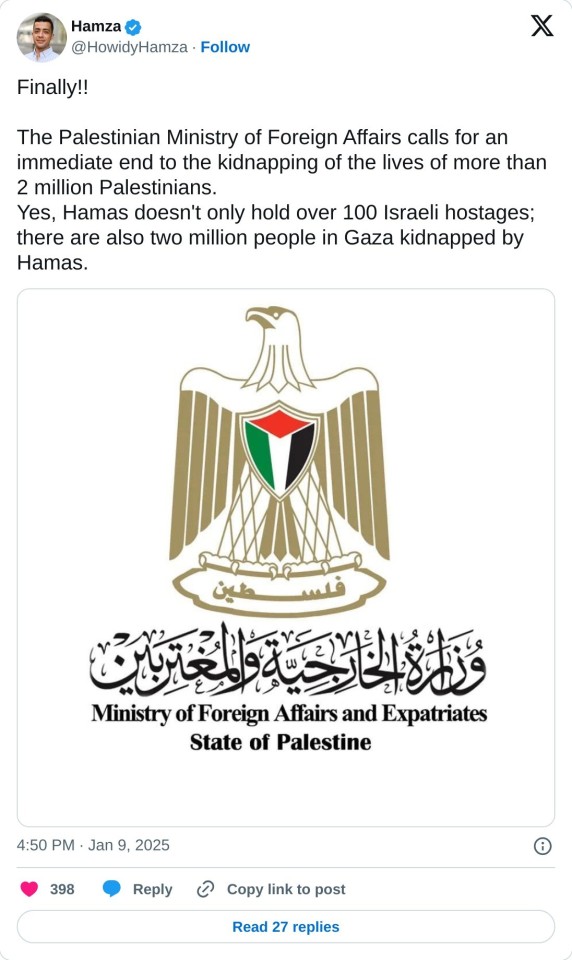
That's from one of the co-organizers of the We Want To Live movement, who has twice been jailed and tortured by Hamas for organizing marches in Gaza.
He's only 24, and he's repeatedly put his life on the line for Gaza's freedom. And there is not one person in the pro-Palestine movement that will platform him, or anyone like him. Even Ahmed Fouad Alkhatib -- another Gazan activist, one who hates Israel significantly more than Howidy -- gets pre-emptively blocked.
Anyway, the context for the whole "they'll call them Zionists" thing was that the Hind Rajab Foundation filed 12 complaints against IDF soldiers.
Which does make it seem like that must be what everyone's going to be called Nazis for joining?
The Hind Rajab Foundation is chaired by a former Hezbollah member: Dyab Abou Jahah, a Belgian man from Lebanon who also:
founded a Holocaust denial group;
has repeatedly called for the violent destruction of Israel;
says Europe makes "the cult of the Holocaust and Jew-worshiping its alternative religion";
questioned the existence of the Nazi gas chambers;
and calls gay men “AIDS spreading faggots”...
...just to hit the highlights.
The article notes that there were no troops around when Hind Rajab was killed. Which is news to me, because I only learned about it on social media.
So basically, a guy who is at best a Nazi apologist started a group named after someone who wasn't killed by the IDF, but who he wants us to think was. And now that group is running "a campaign... to identify Israeli soldiers who have published videos to social media in which they commit, claim to have committed, or appear to endorse committing potential war crimes, and to file complaints against the soldiers on that basis."
@stoptheantisemitism blocked me after I said you can't just report people you assume must have committed a war crime. Because surely you can, since "they've posted themselves committing atrocities all over social media" or whatever.
But in fact, the article they posted literally says that the campaign includes people "who appear to endorse committing potential war crimes."
And no matter how despicable or disgusting that is, it's also absolutely fucking silly to be like, "Hey!! Sri Lanka!! SRI LANKA!! This guy who tweeted about wanting to burn Gaza City to the ground is in your country right now!!! Arrest him!!!!!!"
The fuck you want Sri Lanka to do about that??? He didn't commit a crime on their soil, and he's not a citizen of their country.
So I'm assuming you're talking about the IDF. But what's the point of saying that future historians will imply people were Nazis for joining the IDF even if they don't hate Palestinians? People are already calling them that today.
More to the point, it's not like there's a massive movement to move to Israel and get permission to join its military.
Is the point just to make sure we damn everyone in the IDF, whether they personally hate Palestinians or not, whether they were conscripted or not, etc?
Is the point just to call them Nazis?
Is the point to minimize the Nazis by deemphasizing what they did?
Because it seems important that Hitler not only industrialized mass murder and killed a peak of 500,000 people a month, but also:
declared a state of emergency,
seized dictatorial powers,
stripped Jews of their citizenship,
made relationships and sex with them illegal,
pressured white people to boycott all Jewish businesses,
and banned them from leaving the country without turning their property and money over to the Nazis,
none of which Israel has ever done to either the Palestinalsians, or its own Arab citizens.
like, I would assume that nobody is making a conscious attempt to minimize what the Nazis did. But it minimizes what they did either way.
#holocaust inversion#disinformation#genocide#fuck hamas#jumblr#fuck the chinese government too#fuck the dictatorship of iran too#fuck putin too
285 notes
·
View notes
Text
So I’m in a health care major in college, and I’m having my first season of high holy days as a Jew-ish person. So, being a busy student along with having many days I need to take off in October, I’ve gotten very used to talking to professors.
I’m in a class for cultural advocacy and bias in the medical setting. We’ve spent hours reviewing case studies, talking about social determinants and education, and general cross cultural acceptance. We talked at length about different and equitable approaches for religious minorities- in terms of dietary needs, holidays, and lifestyle.
I didn’t expect any trouble with taking this class off. So I approached my professor and told her that because of Rosh Hashanah next week, I wouldn’t be able to attend class next Thursday.
She turned to me, very sweetly and said “okay! Just make sure to use your golden pass!”
The one time golden pass is provided to every student in the course- specifically for menial situations. You could use this just because you’re hung over, a little sick or just don’t feel like it.
Religious holidays are not- and as noted in my university’s policy on this very matter - “an optional day off.” I should not have to use my one “fun pass” for a genuine cultural obligation. And this isn’t me just saying that. This is the college’s policy.
If this happened in an anatomy class with a STEM driven professor, I’d be a little annoyed but ultimately understanding. But this is a class where we’ve discussed social policy at length and the importance of diversity. The least I could expect was for the fine bullet points on our own school standards to be read.
So as I write an email to her, gently explaining this and having my request in writing, I have to channel my frustration somewhere.
What can I say? I’m very much getting the Jewish experience.
#fromgoy2joy thoughts#jumblr#jewish#jewblr#jewish tumblr#jewish convert#jewish conversion#tw antisemtism#antisemitism#rosh hashanah
433 notes
·
View notes
Text
My grandparents all survived the Holocaust. A part of our family did not. I chose to dedicate years of my life to studying and educating against such hatred, violence and atrocities.
I know what a genocide is.
I also know what a defensive war in residential urban settings against a fanatic, genocidal terrorist organization using its own civilians as human shields is.
And I know the difference. Because yes, there is a difference, even as there might be pockets of incidental injustice within that war (as is the case with all wars).
And it doesn't matter how many times the g-word will be used unjustifiably, it cannot make me confuse those two things. It also cannot convince me that people here confusing the two is any sort of a moral stance. It's just ignorant, has proven itself harmful to Jews, and is also doing a real disservice to victims of actual genocides.
(for all of my updates and ask replies regarding Israel, click here)
#israel#israeli#israel news#israel under attack#israel under fire#israelunderattack#terrorism#anti terrorism#antisemitism#hamas#antisemitic#antisemites#jews#jew#judaism#jumblr#frumblr#jewish
438 notes
·
View notes
Text
Uggghhh, what is UP with Canada?!
In Vancouver, the Schara Tzedeck synagogue's windows were smashed on April 19th.
In Toronto on April 19, five windows at the Kehillat Shaarei Torah synagogue were smashed with a hammer.
In Toronto on April 26, someone set a sign on fire at Beth Tikvah Synagogue....
....And again on April 28.
In Toronto in May, Jewish community members started escorting a kid to school because he was being bullied by peers who told him, "We're going to do to you what Hamas did to Israel," pushed him, kicked him, threw stones at him, and told him, "we need to kill you." This had been going on for six months. (His family had gone to both the school and police repeatedly at this point and it had only escalated; the kids throwing stones at him on the way to school was new.)
In Toronto on May 17th, Kehillat Shaarei Torah's windows were smashed again.
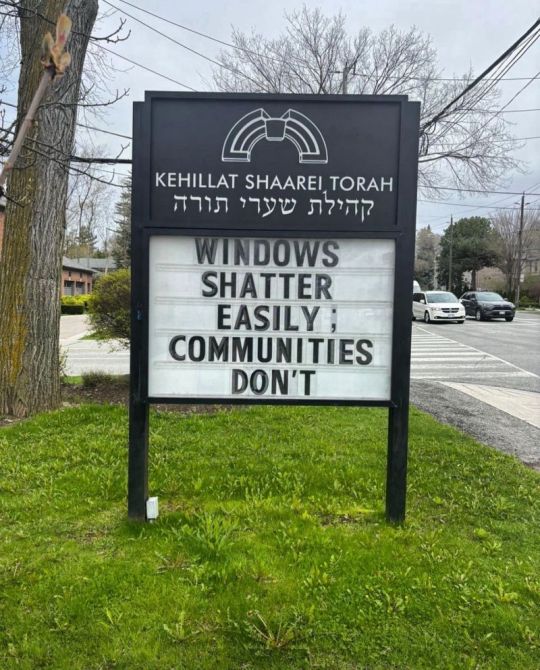
On May 25th before dawn, two people shot at Bais Chaya Muska, a Jewish girls' school in Toronto.
On May 29th, in the middle of the night, someone shot at the Belz Yeshiva Ketana school in Montreal.
In Vancouver on May 30, someone poured fuel on the doors of the Schara Tzedeck synagogue, then firebombed them.
In an article on June 7, Rabbi Lisa Grushcow of Emanu-El-Beth Sholom synagogue in Montreal said people have yelled “Hitler was right!” and “Jew!” at her congregants as they arrive for Shabbat services and that Jewish kids are being bullied in local schools.
On June 1 in Toronto, a man smashed the window of the Anshei Minsk synagogue with a rock.
On June 3 in Kitchener, someone smashed the front door of Beth Jacob synagogue.
On June 19th in Montreal, three small bullet-like holes were somehow made in the windows of Falafel Yoni. (I don't know, all the articles go out of their way to say they don't know WHAT made the holes.) Falafel Yoni is owned by a Jewish man who was born in Israel, and has appeared on boycott lists despite the owner never having said anything political about Israel.
On the same day, down the street from Falafel Yoni, someone smashed the windows of a nearby gym whose co-owner is Jewish and had also been born in Israel.
On June 30 in Toronto, someone threw stones at the Pride of Israel synagogue, then at Kehillat Shaarei Torah, smashing windows (again) in the latter.
On the weekend of July 27th, a father and son in Toronto were arrested for planning a terrorist attack and murder on behalf of ISIL, which is wild.
On July 29th, someone torched a bus belonging to the Bobov Hassidic school in Toronto.
And smashed the windows of a DIFFERENT Jewish school in Toronto, Leo Baeck Jewish Day School, and set it on fire.
On July 31 in Toronto, guess which synagogue had three signs set on fire? That's right: Kehillat Shaarei Torah.
Plus one sign set afire at Toronto's Temple Sinai Congregation the same night, presumably by the same arsonist, who might even have been the stone-hurler of June 30.
There are probably ones I missed. Just putting this list together took like three hours, though. I kept having to go, "Wait, surely that can't be the same synagogue AGAIN" and "they only mention the closest major intersection, which one was this?!" and "that can't be a different one, how many windows did they smash??" and go look for more sources. Plus a couple of articles were giving conflicting dates for one of the incidents.
And nobody ever gives actual dates, they just say shit like, "Blah blah blah was reported Monday...." so I have to look at the article date and then look at a damn calendar.
I went back as far as April because everything I found was referring to earlier incidents. Back to April. February and March were relatively quiet, at least in the news. Although interestingly, February is when the most hate crimes in Toronto had been reported, at least as of ... oh, I see.
As of March.
On the bright side, I did discover that Kehillat Shaarei Torah consistently has great jokes on its sign.
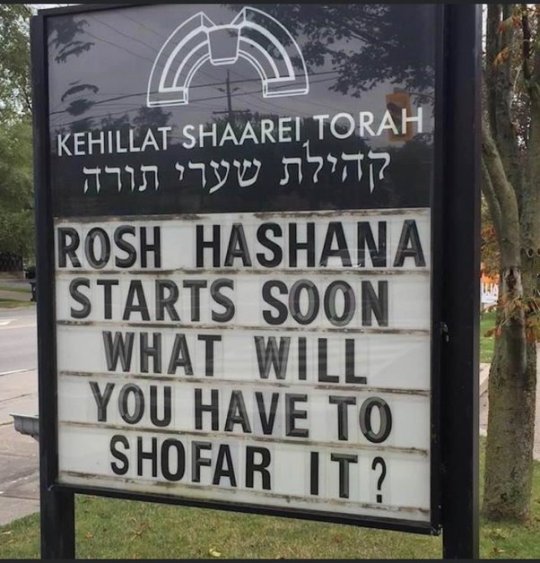
#antisemitism#judenhass is such a good word#jew hatred is what it means#reblog to fight antisemitism#jumblr#jewblr#wall of words#gun violence tw
440 notes
·
View notes
Text
Three pages of google full of reports on the Christmas market car ramming attack in Germany this morning.
I feel terrible for the victims but when the synagogue was set on fire in Australia there was barely four articles total for the first few days. After they started reporting, there were pages devoted to questions if it was antisemitic terrorism. When Jews were attacked in Amsterdam for a week, there were pages and pages of news reports justifying the violence. I haven’t seen any reports justifying the car attack in Germany. They rammed cars into Jews in Amsterdam too, but it wasn’t a big deal to the news then.
Just look at the difference. Victims of violence shouldn’t be treated like suspects. It would be terrible to treat victims of political violence like they deserve it. But when it’s Jews the news says it’s different.
220 notes
·
View notes